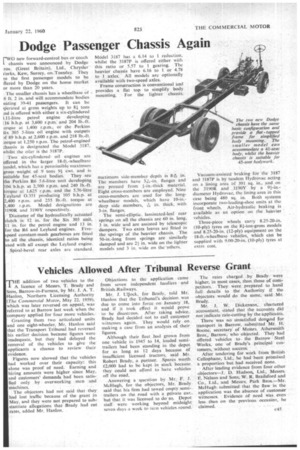Vehicles Allowed After Tribunal Reverse Grant
Page 83

If you've noticed an error in this article please click here to report it so we can fix it.
THE addition of two vehicles to the A licence of Messrs. T. Brady and Sons, Barrow-in-Furness, by Mr. J. A. T. Hanlon, Northern Licensing Authority (The Commercial Motor, May 22, 1959), which was later reversed on appeal, was referred to at Barrow last week when the company applied for four more vehicles..
Granting them two articulated units and one eight-wheeler, Mr. Hanlon said that the Transport Tribunal had reversed his earlier decision because figures were inadequate, but they had delayed the removal of the vehicles to give the applicants a chance to review their evidence.
Figures now showed that the vehicles had worked over their capacity: this alone was proof of need. Earning and hiring amounts were higher since May, and customers' demands had been satis-, fied only by overworking men and machines. • The objectors had not said that they, had lost traffic because of the grant in May, and they were not prepared to sub stantiate allegations that Brady had cut rates, added Mr. Hanlon. Objections to the application came from seven independent hauliers and British-Railways. , Mr. J. Uljock, for Brady, told Mr. Hanlon that the Tribunal's decision was due to come into force on January 18, and if it took effect it would prove to be disastrous. After taking advice, Brady had decided not to Call customer witnesses again. They would rely on making a case from an analysis of their figures.
Although their fleet had grown from one vehicle in 1945 to 14, loaded semitrailers had been standing in the depot for as long as 12 days because of insufficient licensed tractors, said Mr.. Robert Brady, a partner. Spares worth £2,000 had to be kept in stock because they could not afford to have vehicles off the road.
Answering a -question by Mr. F. J. McHugh, for the objectors, Mr. Brady: said that his firm had towed empty semiqailers on the road with a private car,, but that it was licensed to do so. Depot staff were working beyond midnight seven days a week to turn vehicles round.
The rates charged by Brady. were higher, in most cases, than those of competitors. They were prepared to hand full details to the Authority if the objectors would do the same, said Mr. Brady.
MTW. Dickenson,. chartered accountant, stated that the accounts did
• not indicate rate-cutting by the applicants.
There was no unsatisfied denied for transport in Barrow, submitted Mr. H. Boone, secretary of Messrs. Athersmith Bros., Barrow, who objected. They had Offered vehicles to the Barrow Steel Works, one of Brady's .principal customers, without success.
After tendering for work from British Cellophane, Ltd., he had been promised a proportion but had received none.
After leading evidence from four other objectors—J. D. Hudson, Ltd., Messrs. E. Nelson and Sons, W. R. Brailsford and Co., Ltd., and Messrs. Park Bros.—Mr. McHugh submitted that the flaw in the application was the absence of customer Witnesses. Evidence of need was even less than on the previous occasion, he claimed.












































































































































